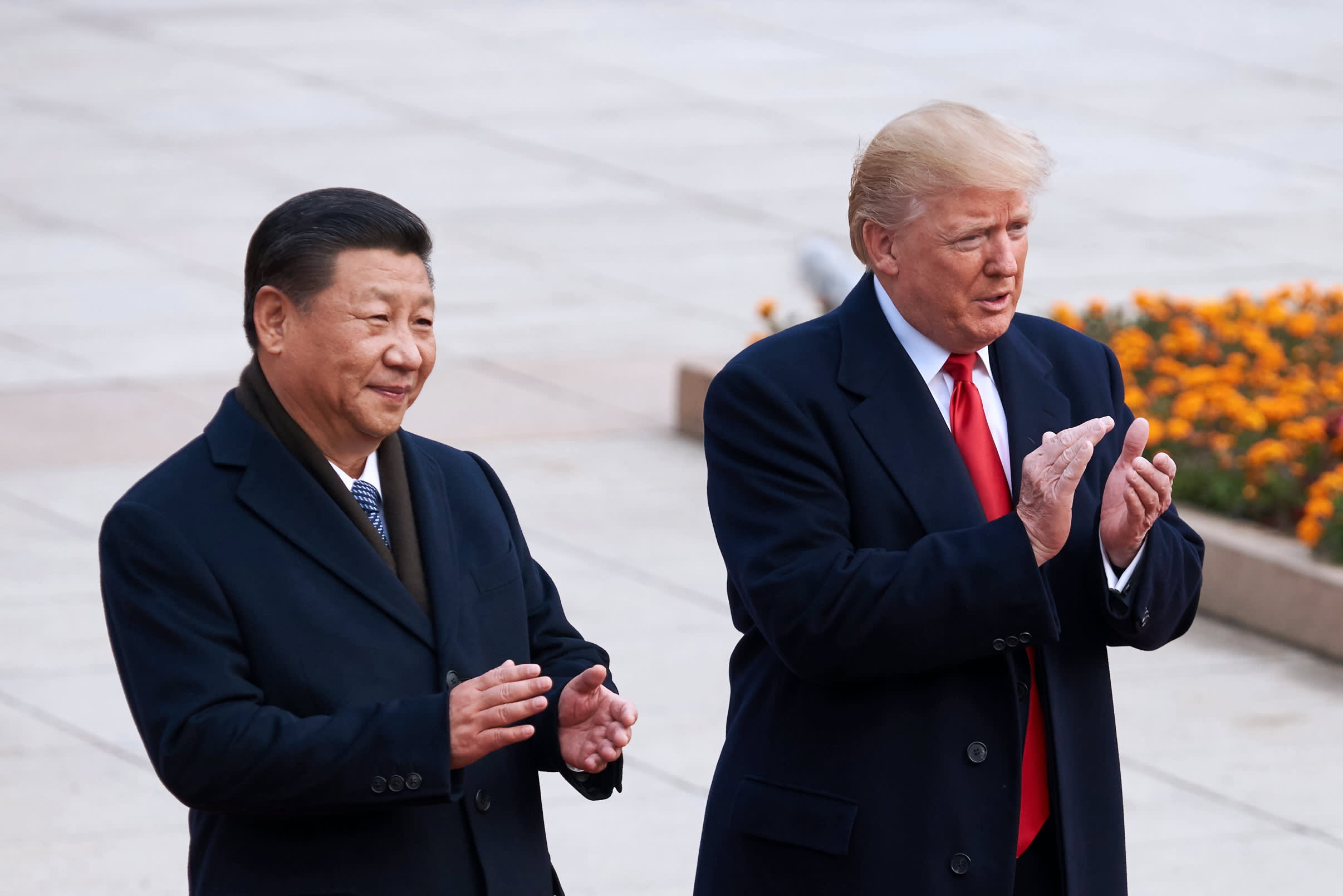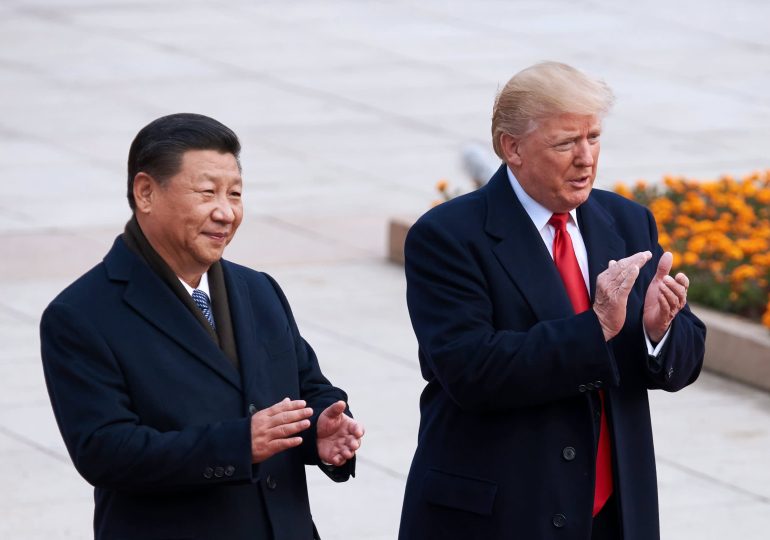
BEIJING — If Donald Trump wins the U.S. presidential election, his plans for 60% tariffs on Chinese goods could be a “major downside growth risk” to China, according to Goldman Sachs.
Chances of Trump becoming the next president ticked higher after he survived an assassination attempt on Saturday and selected former critic JD Vance as his running mate two days later.
“Right now exports are a major bright spot in the Chinese economy, and I think the policymakers might want to be prepared,” Hui Shan, chief China economist at Goldman Sachs told CNBC’s “Squawk Box Asia” on Tuesday.
“We are seeing tariff narratives, not only in the U.S., but across other major trading partners of China’s,” she said. “So this is not going to be a sustainable driver of growth for China.”
The U.S. is China’s largest trading partner on a single-country basis, while the European Union has fallen behind Southeast Asia as China’s largest regional trading partner. Trump had raised duties on Chinese goods when president in 2018 and has threatened to increase them to 60% if reelected this fall.
The contribution of goods exports to real GDP growth in China for the second quarter of this year was the highest since the first quarter of 2022, when Covid restrictions limited domestic economic activity, according to Citi.
Meanwhile, Beijing’s push to develop high-end manufacturing has not yet been able to fully offset a real estate slump and lackluster consumption.
U.S. officials such as Treasury Secretary Janet Yellen have said that China’s policies to boost its industrial capability and technological self-reliance have led to U.S. job losses.
China the ‘biggest threat’?
In his first interview since he was selected as Trump’s running mate, Vance told Fox News that instead of the war in Ukraine, China was the “real issue” for the U.S. and posed the “biggest threat.”
The Biden campaign has criticized Trump’s pick, saying the choice was deliberately made “because Vance will do what Mike Pence wouldn’t on January 6: bend over backwards to enable Trump and his extreme MAGA agenda, even if it means breaking the law and no matter the harm to the American people.”
Supporters of Trump, who was president at that time, had stormed the U.S. Capitol in an attempt to overturn the 2020 presidential election results on January 6, 2021.
Asked about Vance’s comment, China’s Ministry of Foreign Affairs spokesperson Lin Jian said Tuesday at a daily press briefing, “We are always opposed to making China an issue in U.S. elections.”
Calls for stimulus
China’s economy grew by 4.7% in the second quarter compared to a year ago, missing economists’ expectations and bringing growth for the first half of the year to 5%. It prompted some calls for more stimulus if the world’s second-largest economy is to reach 5% growth for the full year.
The downside risk from potentially higher U.S. tariffs under Trump would primarily come from the greater uncertainty and tighter financial conditions, as well as pressure on the Chinese yuan, Goldman’s Shan said. She pointed out that tariffs in 2018 did not significantly dent China’s exports to the U.S.
More recent data, however, showed a slowdown in that trade. China’s exports to the U.S. rose by a modest 1.5% in the first half of the year.
“Policymakers need to think about domestic demand and focusing on something that is more persistent and sustainable for the growth outlook,” Shan told CNBC on Tuesday.
If 60% tariffs are imposed, “that’s pretty high and we think the implication for the macro economy is pretty significant,” she added.
So far, China has held back on stimulus measures. The country’s top leaders are meeting in Beijing this week for a highly anticipated Third Plenum, which is expected to determine long-term economic policy goals.
Citi analysts said Monday that weak retail sales and disappointing second-quarter growth won’t be enough to convince Beijing to increase support for the economy.
“Policymakers may tolerate short-term weakness amid the structural shift of the property sector,” the analysts said. “More concerns on trade and external relationships could also lead China to save the policy space for future.”
Citi forecasts 5.0% growth in real GDP growth for China this year.
China’s U.S. dollar-denominated exports grew by 3.6% in the first six months of the year after better-than-expected global demand for Chinese goods in recent months.
“Manufacturing and infrastructure investment may stay robust and exports should stay in decent [year-on-year] growth in [the third quarter], with possible front-loading of shipment orders in [the second half of the year] due to fears of higher tariffs,” Tao Wang, head of Asia economics and chief China economist at UBS Investment Bank said in a note Tuesday.
She said Chinese authorities would likely be reluctant to roll out major stimulus in the next few months in order to save resources in the case of greater economic weakness and increased tariffs.
UBS forecasts 4.9% growth for China’s economy this year.
Trump the dealmaker
Not all analysts believe a possible Trump presidency will prove detrimental to China, though.
Ben Harburg of Corevalues Alpha told CNBC on July 4 that he believes China is more likely to have “positive” trade outcomes under a Trump presidency, given the ex-president’s “transactional nature.”
“He’s a dealmaker, and like any negotiator, he likes to kind of set the bar low, and kind of set his price low, and then work up from there,” the portfolio manager said on “Street Signs Asia.”
Speaking on foreign policy, Harburg pointed out that another Biden term would also mean continued tariffs, as well as “encroachment on Chinese domestic issues” — which would not significantly improve China’s economy, nor U.S.-China relations.
He said a Trump-China partnership would signify “a more binary potential for a positive outcome for China.”
CNBC’s Sonia Heng contributed reporting from Singapore.









